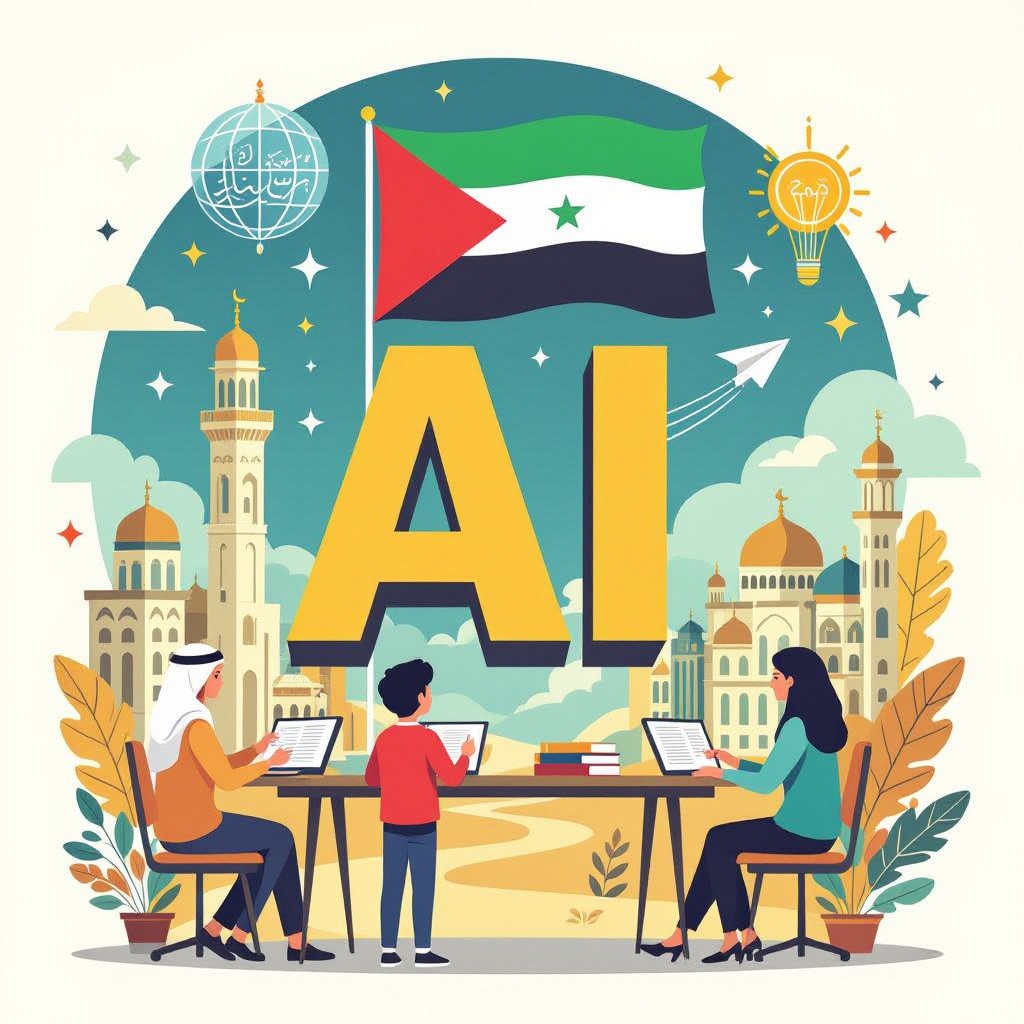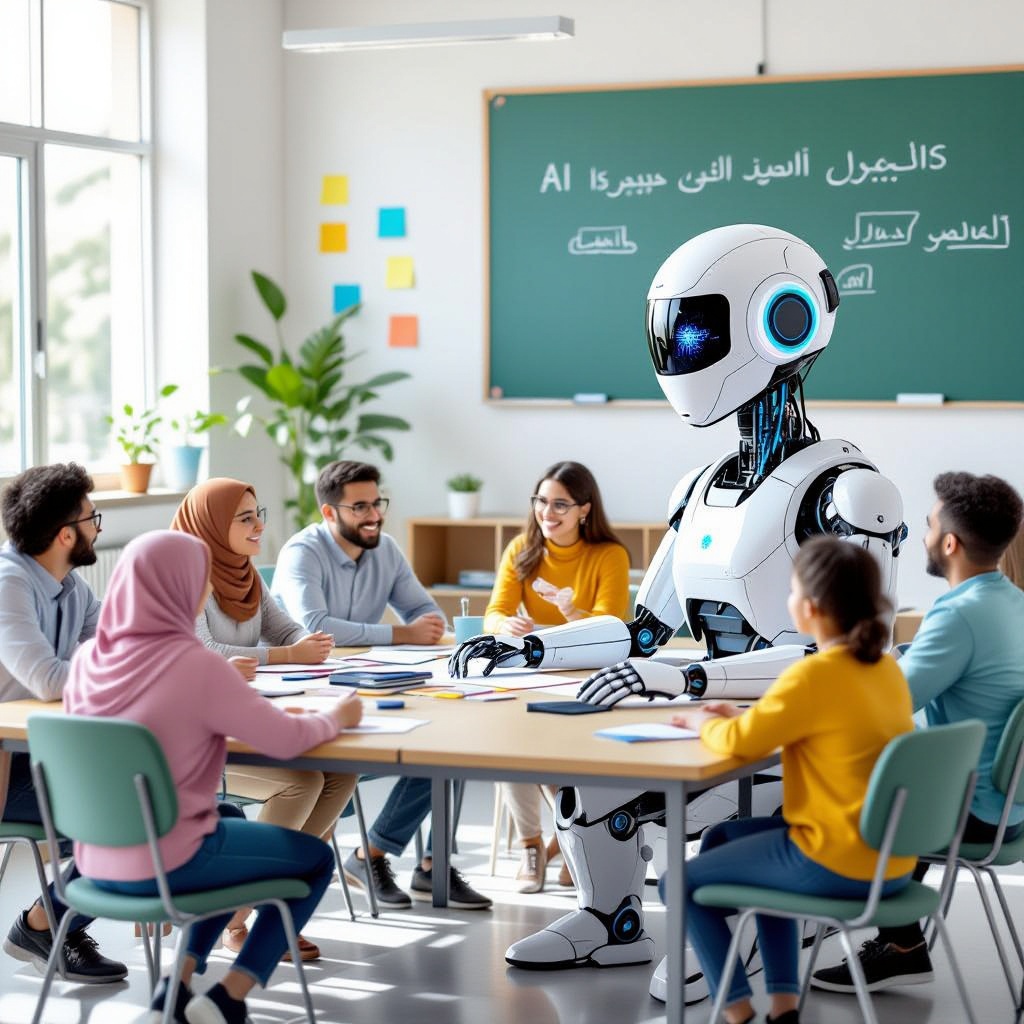The GCC countries are swiftly integrating AI into their education systems. Nations like Saudi Arabia and the UAE are embedding AI as a core component of their national visions. These efforts aim to modernize education, boost digital initiatives, and prepare students to engage effectively in a global AI-driven economy.
Key Takeaways
- Saudi Arabia’s Vision 2030 and the UAE’s AI Strategy 2031 present AI as an educational cornerstone.
- The GCC EdTech market is on track to grow significantly, potentially reaching $7.19 billion by 2035.
- AI integration seeks to support personalized and adaptive learning experiences in GCC schools.
- A strong need exists for skilled talent to sustain the rapid AI adoption across the region.
- Regional cooperation and increased funding in AI education and R&D are crucial for overcoming strategic challenges.
GCC’s Ambitious Pursuit of AI in Education
GCC countries are making AI central to their educational strategies. Countries like Saudi Arabia and the UAE are leading this charge by embedding AI into their national visions. Saudi Arabia’s Vision 2030 makes AI a key component of its educational framework. The UAE’s AI Strategy 2031 takes an equally visionary approach, focusing on cultivating a world-class AI ecosystem. These initiatives aim to modernize education and prepare students for future challenges.
In terms of AI maturity, Saudi Arabia and the UAE stand as ‘AI Contenders,’ striving for prominence on the global AI stage. Other GCC nations, classified as ‘AI Practitioners,’ are also pushing the boundaries but haven’t yet reached ‘AI Pioneer’ status. This ambition underscores the GCC’s commitment to advancing AI capabilities, even partnering with global tech firms and academic institutions to boost their skills and infrastructure further. source.

Booming EdTech Market and Integration of AI
The GCC EdTech market is on a fast upward path. It’s predicted to expand from $3.73 billion in 2024 to $7.19 billion by 2035, pushed by a 6.1% CAGR. This growth reflects the importance placed on technology in education across the region. AI is similarly experiencing a rapid surge. With a projected CAGR of 28.63%, the AI market in GCC is expected to hit $15.4 billion by 2030. This growth is largely spurred by significant government investments and digital initiatives.
For those wanting in-depth data and forecasts, checking resources like MarketWatch can provide valuable insights. The swift pace of change emphasizes the need for educational institutions to adopt these new technologies quickly. Investing in AI-enhanced tools will turn plans into actionable and impactful learning experiences.
AI in GCC Curricula: Preparing a New Generation
GCC schools are transforming their educational frameworks to include AI. The UAE is setting ambitious goals, aiming to weave AI education into the K-12 curriculum by 2025. Qatar is highlighting the significance of STEM, with plans such as the National Skilling Program, aiming to train 50,000 individuals in AI and data science by 2025. Meanwhile, the UAE targets 10,000 trained specialists by 2030.
Instructors are increasingly incorporating generative AI in their teaching methods, preparing students for future challenges. Esteemed institutions like MBZUAI play a pivotal role in nurturing AI specialists. They provide insights into faculty practices and methodologies. As the demand for AI proficiency grows, these countries are opting for advanced programs to ensure that students are well-equipped for the future. For further information, take a look at the World Economic Forum and its insights into AI’s impact on education strategies.
AI-Driven Personalized Learning Experiences
AI shapes personalized education by offering adaptive learning platforms tailored to individual student needs. These platforms adjust content based on a student’s performance, ensuring the right level of challenge and support. Alongside this, AI tutoring bots provide instant, personalized feedback and assistance, acting as virtual mentors for students who need a bit more or less.
Incorporating gamification into these experiences boosts student engagement. Students find joy in learning through games that are as informative as they are enjoyable.
Moreover, AI-powered analytics help deliver a custom-fit educational approach. They assess performance data to help educators identify a student’s strengths and areas for improvement. This means educators can craft learning experiences that effectively address each student’s unique requirements. If you’re interested in understanding more about these innovations, you might find EdSurge a great resource for educational technology insights.

Adoption Rates and the Need for Skilled Talent
The surge of AI in the GCC has been staggering, with generative AI models embraced by 75% of businesses. It’s not just the companies tapping into this technology; 76% of residents actively use AI-powered services, marking a pivotal shift in societal norms and expectations. As AI continues to integrate into daily life, bridging the skill gap becomes imperative.
A significant challenge is the persistent lack of skilled professionals to support this widespread tech adoption. Building sustainable talent pipelines is essential for ensuring that AI’s potential is fully realized. Many educational institutions and governments in the GCC are collaborating to address this issue, crafting initiatives to upskill the current workforce and educate the new generation.
How can these efforts be further supported? The answer lies in fostering regional cooperation and sharing best practices. By encouraging partnerships between universities, tech companies, and government bodies, the GCC can create a more resilient talent pool. One example is the use of platforms like Coursera and edX, which offer an array of online courses to enhance tech skills. These platforms can serve as catalysts for personal and professional growth.
Investing in quality education and training today will lead to a more competent and capable workforce tomorrow. The transition to an AI-driven economy is already underway, but its success hinges on the region’s ability to cultivate a robust skill set among its inhabitants. For more insights into AI adoption strategies, you can explore resources from McKinsey.
Strategic Challenges and Future Roadmap
Schools in the GCC face hurdles like a glaring shortage of AI-ready talent. Filling this gap requires coordinated skilling programs across the region. Investing in education and training will equip students with necessary AI competencies.
Boosting regional cooperation is essential. By increasing AI funding and fostering partnerships in research and development (R&D), schools can create synergies for greater innovation. Policies must adapt to make AI literacy as pivotal as Arabic in curriculums.
Here’s a look at crucial actions:
- Develop region-specific AI training programs.
- Encourage public and private funding in AI education.
- Forge partnerships with international institutions to enhance R&D.
With these steps, schools ensure students are equipped for future career opportunities. For more on global education strategies, explore insights on UNESCO’s education framework.

Sources:
Boston Consulting Group – “The GCC AI Pulse: Mapping the Region’s Readiness for an AI-Driven Future”
Market Research Future – “GCC EdTech Market Research Report”
Digital Bricks AI – “The State of AI in the Middle East 2025”
MarkNtel Advisors – “GCC EdTech Market”
Outter – “GCC AI Statistics You Wouldn’t Believe: AI Market in GCC 2025”
Proven Solution – “7 New Trends in Educational Technology in the GCC”
Observer Research Foundation (ORF) – “AI in Education in the UAE”
GSI in Education – “Education Technology Investment in 2025: A Transformative Year Ahead”

3 Comments
[…] also lead in embracing technology, investing heavily in AI and VR tools, while public schools often struggle with integrating such […]
[…] UAE plans to phase out traditional exams, launching a national AI curriculum in the 2025–2026 academic […]
[…] with Qatar’s focus on innovative pedagogy, blended and hybrid learning models might become more mainstream. Students could engage in virtual […]